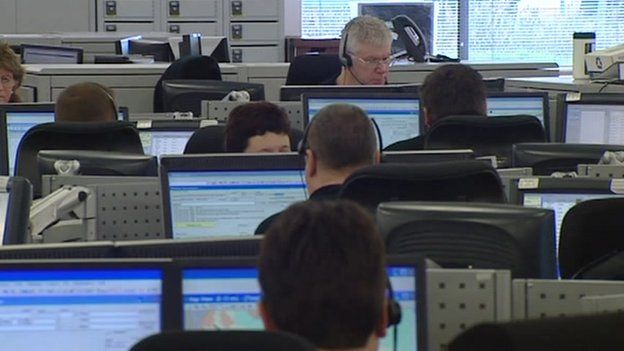Police Scotland call centre closures delayed
- Published

The Scottish government has said plans to close local police call centres are to be delayed.
The move is the result of an inquiry into the deaths of two people in a car accident on the M9 in July.
Police Scotland only investigated the crash three days after it was reported to them in a phone call.
A report by Her Majesty's Inspectorate of Constabulary in Scotland said there were staff shortages and problems with the way emergency calls were handled.
Diverting calls away from regional police call centres to main centres in other parts of the country creates "additional risk", the police watchdog said.
First Minister Nicola Sturgeon said she was deeply sorry for the anguish of the families of those who died in the M9 crash, and said the closure of police control rooms would be put on hold in line with the HMICS recommendation.
Justice Secretary Michael Matheson later told the Scottish Parliament that £1.4m of new money would be committed to taking on 70 to 75 new call handlers, and to keeping the Aberdeen and Inverness control rooms open for longer than originally planned.
Those centres were due to close by March 2016, but they will now stay operational for longer for an "extensive handover" when the new main centre opens in Dundee.
Mr Matheson said: "The M9 incident had terrible consequences, and I don't want any families to have to go through that experience again."
It comes a week after Sir Stephen House announced he is to stand down early from his post as chief constable of Police Scotland, and two days after Ms Sturgeon announced a national review of the force's governance.
HMICS began its review of all police call handling in Scotland after the death of Lamara Bell, who was discovered critically ill in a crashed car on the M9, next to her dead partner John Yuill.
Sir Stephen admitted that the information received about the crash in the initial call had not been entered into police systems, in a situation Ms Bell's brother Martin described as an "absolute shambles".
The Police Investigations Review Commissioner (Pirc) is investigating the incident itself, while the HMICS review examined the broader issue of call handling.
Derek Penman, HM Inspector of Constabulary in Scotland, said more than 3,800 people were spoken to during the "extensive consultation" on control rooms.
He said: "HMICS recognises the constraints placed upon Police Scotland as a result of staff shortages in Bilston Glen, Inverness, Aberdeen and Dundee, but considers that the practice of diverting overflow calls to the main sites in Govan, Motherwell and Bilston Glen is creating additional risk.
"This will not be resolved until there is a full complement of trained staff supported by effective systems, processes and procedures in the main sites and we strongly believe that, until that is the case, the facilities in Inverness, Aberdeen and Dundee should remain in place."
The full HMICS report on call handling will be published in October.
In the interim, the watchdog has recommended that Police Scotland "consolidate and stabilise" staffing, procedures and processes in its centralised East and West call centres, while accelerating plans for the new North area control room in Dundee.
'Absolute shambles'
Martin Bell, brother of Lamara Bell, who died in the crash, said the family felt "let down" by police and the government and that he believes his sister would have lived had the call been responded to on the day of the crash.
He also said he wanted to see the local call centres remain open.
He said: "It's been terrible, it's a disgrace how it's been handled. It's just a nightmare. The system is a mess and it needs to be fixed.
"To be honest I think it needs to go back to a regional service - it's an absolute shambles. There needs to be a full change of Police Scotland.
"Officers need to win back the faith of the public and unless there's change that isn't going to happen."
'Exciting role'
Mr Matheson also announced the new chairman of the Scottish Police Authority will be Andrew Flanagan.
Mr Flanagan, who takes up the role formerly held by Vic Emery from Monday, is a former chief executive of children's charity NSPCC and of STV Group.
He said: "The Scottish Police Authority has a unique role at the heart of policing and I'm delighted to be taking on such a demanding and exciting role.
"While I recognise the challenges we face, I believe there is much to build on in Scottish policing - not least the excellent work undertaken every day by the thousands of dedicated officers and staff."
- Published3 September 2015
- Published1 September 2015
- Published27 August 2015
- Published13 July 2015
- Published25 July 2015
- Published31 March 2015
- Published13 July 2015